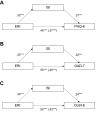Insomnia Partially Mediates the Relationship of Occupational Stress with Mental Health Among Shift Working Nurses and Midwives in Polish Hospitals
- PMID: 36353570
- PMCID: PMC9639594
- DOI: 10.2147/NSS.S375375
Insomnia Partially Mediates the Relationship of Occupational Stress with Mental Health Among Shift Working Nurses and Midwives in Polish Hospitals
Abstract
Purpose: Insufficient sleep increases sensitivity to chronic stress and may be a precursor to the deterioration of mental health and the development of burnout. The aim of our study was to verify whether symptoms of insomnia mediate the relationship of occupational stress with mental health among nurses who work shifts.
Materials and methods: The analyses included 117 female nurses and midwives who work shifts. They filled in the 16-item Effort-Reward Imbalance Questionnaire (ERIQ) assessing occupational stress, the Insomnia Severity Index (ISI), the Patient Health Questionnaire (PHQ-9, the question about sleep was excluded from the analyses), the Generalized Anxiety Disorder Assessment (GAD-7), and the 16-item Oldenburg Burnout Inventory (OLBI) consisting of two scales - Disengagement and Exhaustion (OLBI-D and OLBI-E).
Results: Insomnia partially mediated the association of the effort-reward imbalance ratio with depression, anxiety and the exhaustion dimension of burnout. We found no association of insomnia symptoms with the depersonalization dimension of burnout, but the effort-reward imbalance ratio was associated with the depersonalization scale.
Conclusion: The results showed that occupational stress has varying degrees of influence on mental health, partly depending on the severity of insomnia symptoms among nurses and midwives who work shifts.
Keywords: healthcare workers; mental health; night work; occupational stress.
© 2022 Gustavsson et al.
Conflict of interest statement
The authors declare no conflicts of interest in this work.
Figures


References
-
- Lo Martire V, Caruso D, Palagini L, Zoccoli G, Bastianini S. Stress & sleep: a relationship lasting a lifetime. Neurosci Biobehav Rev. 2020;117:65–77. - PubMed
LinkOut - more resources
Full Text Sources

